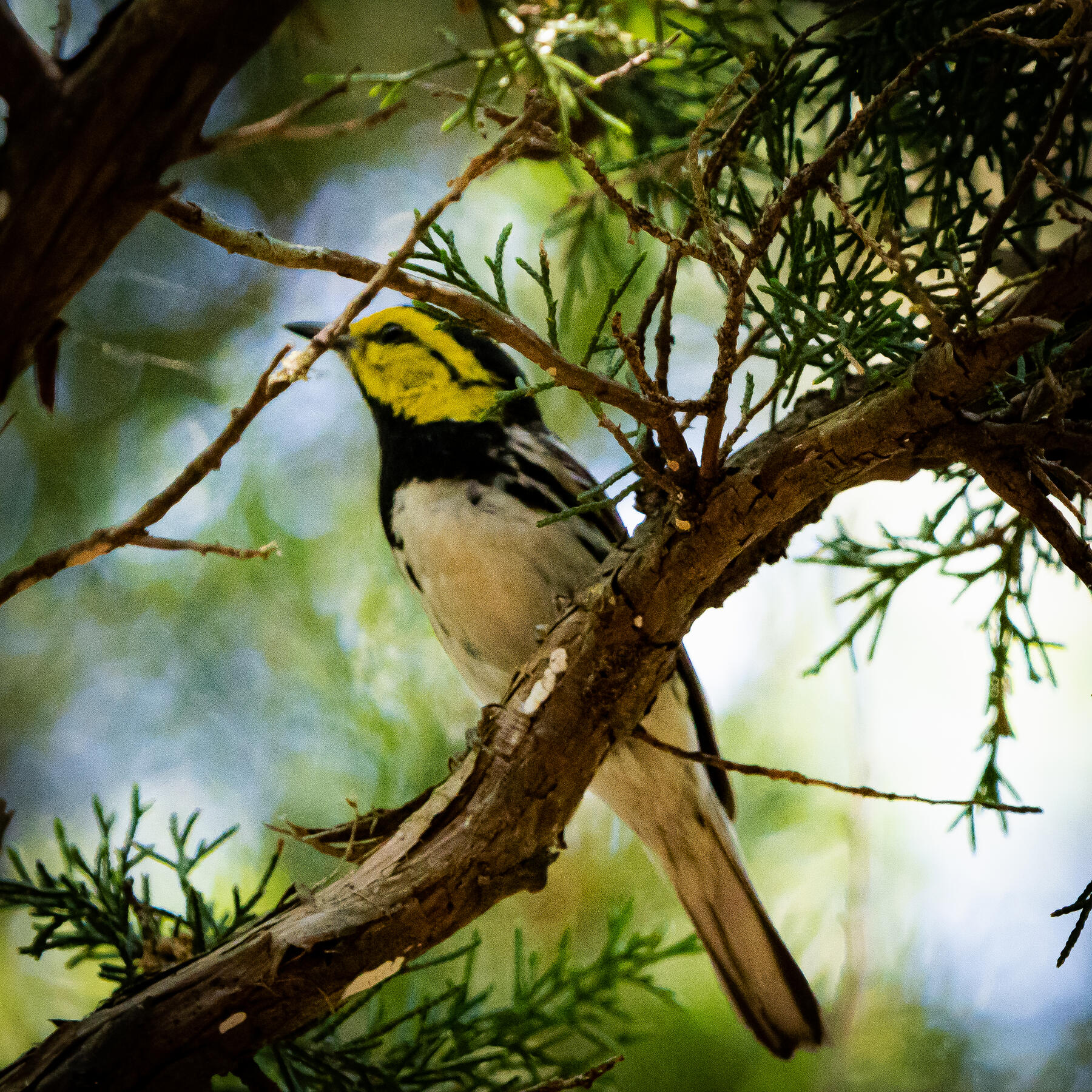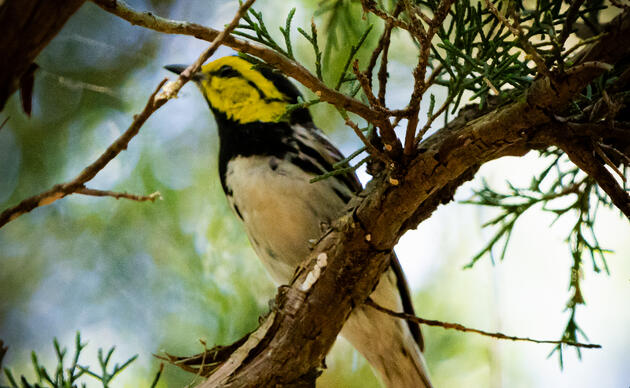STOP Texas House Bill 2239 - support the Golden-cheeked Warbler and the ONLY place in the world where this species can reproduce. HB 2239, if passed, would remove local protections currently in-place for the Ashe Juniper tree. This native Texas trees provides the only nesting habitat for the endangered Golden-cheeked Warbler. (Press Release - May 3, 2023)
Letter, below, sent to Texas House Representatives on April 13, 2023. We thank all of our partner organizations that signed on to this letter: Travis Audubon Society, City of Cedar Hill, The Nature Conservancy, Sierra Club - Lone Star Chapter, Friends of Balcones Canyonlands NWR, Bexar Audubon Society.
On behalf of Audubon Texas and our partners, we would like to express strong concerns regarding Texas House Bill 2239 in its current form. Audubon Texas and our community of 90,000 Texas members, supporters, chapters, and partners are celebrating 100 years of conservation and stewardship across the state. Our mission is to protect birds, wildlife, and the places they live for the betterment of our communities.
Specifically, our concern is the inclusion of the Ashe juniper tree in this legislation. The removal of this native species would threaten the existence of the Golden-cheeked warbler, a federally protected endangered species, and potentially lead to a grave rippling effect across our Texas ecological systems as well as be a detriment to nature-based tourism across the region. This is more than a numbers game – decimation of habitat will have severe implications for this and other species of birds and wildlife.
The Golden-cheeked warbler requires strips of mature Ashe juniper bark—and only Ashe juniper bark—to build their nests. Without mature Ashe junipers, Golden-cheeks cannot successfully breed. In addition, their only nesting grounds are found in thirty-three counties of the greater Central Texas region. This is the only place in the world where this bird can reproduce. Its survival absolutely depends on its habitat. This bill allows for additional threats and degradation to Golden-cheeked warbler nesting grounds, placing this federally endangered bird at even greater risk for extinction.
The Golden-cheeked warbler has delighted birders and nature enthusiasts since it was first identified in the United States during the Civil War era. Biologists began voicing alarm even in the 1800s at the rate at which the bird’s habitat was disappearing. This species requires oak trees, which host insects for feeding their young, and the strippable bark from mature Ashe junipers for its nests. When the first rare and endangered species lists were compiled in the U.S. during the 1960s, Golden-cheeked warblers were already being described as rare. Due to rapid habitat loss through clear-cutting and urban development, the warbler was officially listed as endangered by the U.S. Fish and Wildlife Service in 1990. According to a recent study by Defenders of Wildlife, ongoing habitat loss and fragmentation remain existential threats to the recovery of the bird:
“Since 1985 13% of all forests within the warbler’s breeding range have been disturbed, with greater incidences near the metropolitan areas of San Antonio (32%) and Austin (24%). Additionally, there was a 42% decrease in suitable habitat (i.e., intact forests primarily composed of Ashe juniper and oak stands) and a decrease in mean patch size.”
The Ashe juniper, also known as Mountain cedar, is a native Texas species. However, it is often referred to as a nuisance tree due to many outdated misconceptions. Beyond providing the only nesting habitat for the Golden-cheeked warbler, Ashe junipers play a vital role in our Texas ecology.
Myth: Ashe juniper is not native.
Fact: Ashe juniper has dominated the Texas Hill Country for thousands of years. Early European settlers note seeing "cedar" (a common name) in thickets across the land. Settlers to the Hill Country, known as "cedar choppers," began clear cutting Ashe juniper to use it for their homes, telephone poles, and rail lines.
Myth: Ashe juniper uses too much water.
Fact: Ashe juniper can help with water retention when it rains. Dead foliage under the tree acts as mulch, guiding rainwater to seep at a higher rate into the soil instead of running off. There is also research at Texas A&M University (Wilcox) and the Texas Agricultural Extension (Owens) that is examining how the tree's roots may help with the deeper drainage of water into the Edwards Aquifer below.
Myth: Ashe juniper strips the land and chokes out other hardwood species.
Fact: While bushy Ashe juniper are often prevalent in areas that have been over-grazed or that contain sub-standard soils, they are not the cause, but rather the result of a disturbed landscape. Poor soils or exposed limestone cause Ashe junipers to develop as “pioneering” bushes instead of trees. The bushes reduce erosion caused by rain striking bare soil, add organic matter to the soil, and create shade that encourages microorganism growth. Junipers do not “choke out” grasses and other trees but are some of the first to appear in disturbed areas.
Myth: Ashe juniper is the cause of severe allergies.
Fact: All flowers and trees that bloom create pollen that can induce histamine reactions for humans. Oak, elders, and other trees, as well as mold and grasses all contribute to troubling seasonal allergies. Ashe juniper is no more or less a cause of allergies than any other flowering plant.
We strongly encourage you to reconsider inclusion of the Ashe juniper in HB 2239. The removal of Ashe juniper trees is not only detrimental to the Golden-cheeked warbler population, but also the state economy. Texas is considered the richest birding state in the nation. A 2021 study by the Texas Parks and Wildlife department estimated 2.2 million bird watchers generate approximately $1.8 billion in economic impact annually. Please consider the local community impacts of this bill. Let’s keep a thriving economy benefitted by our native species! Where birds thrive, people prosper.
How you can help, right now
Join Audubon Texas Today
Becoming a member supports our local work protecting birds and the places they need.
Consider a Legacy Gift for Texas
Planned gifts and bequests allow you to provide a lasting form of support to Audubon Texas.
Subscribe to Our Newsletter
Subscribe to our newsletter for updates about Audubon Texas's conservation work, and news about our activities and local events.





